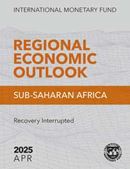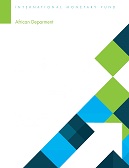This web page provides information in on the activities of the Office, views of the IMF staff, and the relations between Chad and the IMF. Additional information can be found on the Chad and IMF country page, including official IMF reports and Executive Board documents in English and French that deal with Chad.
At a Glance
- Current IMF membership: 191 countries
- Chad joined the Fund in July 10, 1963.
- Total Quotas: SDR 140.2 Million
- Loans outstanding: PRGF Arrangements SDR 26.43 Million
- Last Article IV Consultation: The Article IV Consultation staff report was discussed by the Executive Board on July 3, 2019 (IMF Country Report No. 19/258, published on July 31, 2019)
Office Activities
-
December 2019 REO Presentation
Press articles related to the Presentation (in French)
December 30, 2019
-
December 2019 REO Presentation
Speech by Ahmed Alkhoudar Ali Fadel, Secretary of State for Finance and Budget (in French)
December 19, 2019
-
April 2019 REO Presentation: Opening Speech by Mr. Allali, Minister of Finance and Budget
Video in French
June 17, 2019
Chad and the IMF
-
Macroeconomic Developments and Prospects in Low-Income Countries—2025
April 22, 2025
Subject:Exchange rate arrangements | Foreign exchange | Currency markets | Financial markets | Exchange restrictions | Multiple currency practices
-
Macroeconomic Developments and Prospects in Low-Income Countries—2025
April 22, 2025
Subject: Exchange rate arrangements,Foreign exchange,Currency markets,Financial markets,Exchange restrictions,Multiple currency practices
-
February 26, 2025
On February 24, 2025, the IMF Executive Board concluded the annual discussions with the Central African Economic and Monetary Community (CEMAC) on Common Policies of Member Countries and Common Policies in Support of Member Countries Reform Programs
-
January 30, 2025
The IMF and the Cameroonian authorities have reached a staff-level agreement on the seventh reviews of the Extended Credit Facility (ECF) and the Extended Fund Facility (EFF), as well as the second review of the Resilience and Sustainability Facility (RSF).
-
December 16, 2024
CEMAC (Economic and Monetary Community of Central Africa) countries and institutions have made progress in their reform agenda in recent years. However, challenges persist, including high debt levels, mounting fiscal and external imbalances, and economic diversification and governance issues.
Regional Economic Outlook
April 25, 2025

A hard-won recovery in sub-Saharan Africa has been overtaken by recent events. The sudden shift in the global outlook has clouded the region’s short-term prospects and made policy even more challenging. Adding to existing policy complications there is now an extra premium on resilience—a country’s ability to rebound quickly from future shocks. The region’s progress and perseverance over the past few years is notable, but continued efforts will be needed to sustain the recovery and enhance the region’s resilience. Caution, consistency, and credibility are now more important than ever.
Read the Report
Fraudulent Scam Emails Using the Name of the IMF
We would like to bring to the notice of the general public that several variants of financial scam letters purporting to be sanctioned by the International Monetary Fund (IMF) or authored by high ranking IMF officials are currently in circulation, and may appear on official letterhead containing the IMF logo. The scam letters instruct potential victims to contact the IMF for issuance of a “Certificate of International Capital Transfer” or other forms of approval, to enable them receives large sums of monies as beneficiaries. The contact e-mail information is always BOGUS and unsuspecting individuals are then requested to send their personal banking details which the scammers utilize for their fraudulent activities.For more information please see Fraudulent Scam Emails Using the Name of the IMF
Departmental Papers on Africa




